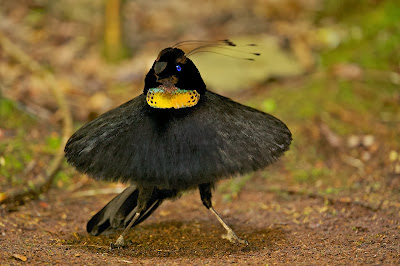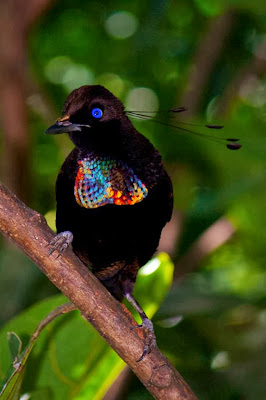 |
| Western Parotia |
Western Parotia belongs to the birds of
paradise (Paradisaeidae family). Its scientific name is Parotia Sefilata. Parotia
is a Greek word, which means curl
of hair by the ear or alluding to plumes on head); and sefilata is a Latin word, which
means possessing six threads, which refers to the plumes on head. Western Parotia common name
notes geographical position relative to other members of the species. Like other birds of paradise they are Sexually dimorphous. The adult Western
Parotia male is approximately 33 cm long with medium length tail, and female is
about 30 cm long. The adult male entirely jet black except for silver triangle
across forehead, intense iridescent emerald green to golden green breast shield
and three quills like wires with
expanded ends above each eye. The adult female with black head, spotted
throat and stripes on face, brown upperparts and tail, and barred underparts.
The adult female is usually unadorned. |
| Western Parotia Dancing |
This species is polygynous. It is presumed that males display seasonally
in overland courts in exploded leks. Male perches above court, flicking wings
and fanning tail. Dropping to court he stretches upwards and raises his broadside
feathers into ‘skirt’, which is maintained as he dances around court, moving
head plumes; sprinkling is static position while raising and lowering his body;
finally thrusts across court with plumage smooth down and head forward and
horizontal to ground to attract females. Females build and attend their nest alone.
 |
| Western Parotia |
The Western Parotia endemic
to Indonesia, West Papua, Vogelkop
(Tamrau and Arfak Mountains) and Wandammen Peninsula (Wondiwoi Mountains). The Western Parotia feeds mostly of fruits such as
figs and insect.
No comments:
Post a Comment